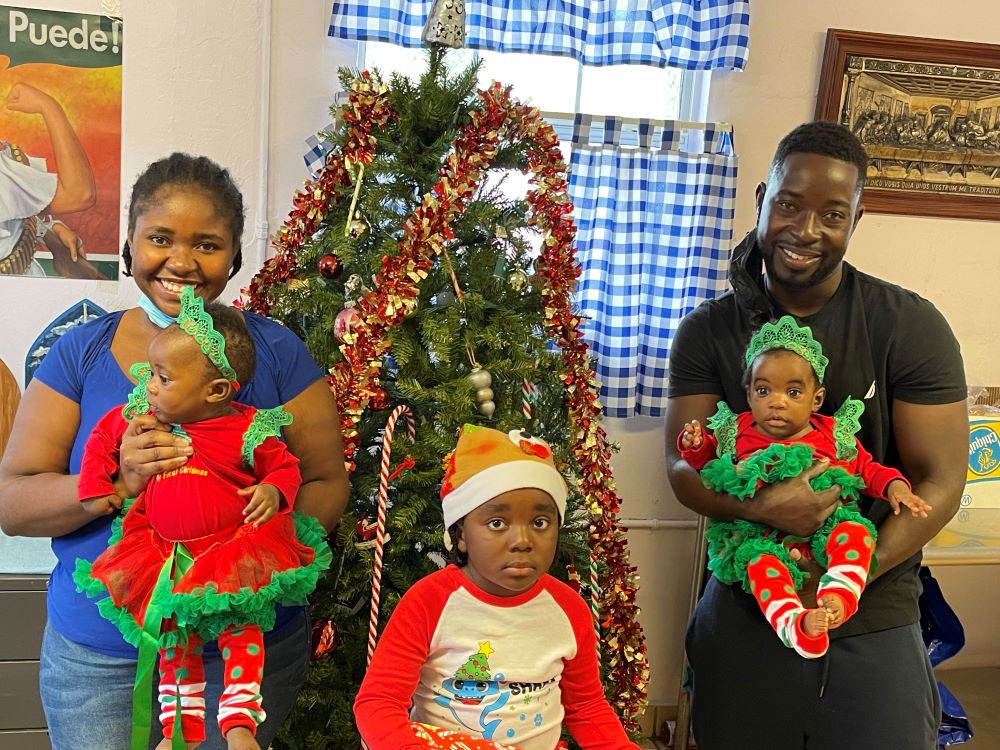
A refugee family from Haiti celebrates Christmas at a soup kitchen in Immokalee, Florida. The twins were born two weeks after the family arrived in the country. (Judy Dohner)
It was Dec. 23 and I was making a last-minute run to Family Dollar store. To my surprise, Christmas was being put away and Valentine's Day cards and candy were being stocked on the shelves.
Before Christmas becomes a memory, let me share how the Christmas story is being lived out today in a poor little town in Florida. Immokalee (home of the Coalition of Immokalee Workers) is an unincorporated farming community made up of Mexicans, Guatemalans and Haitian immigrants. Jesus is there. The Gospel is alive. One just has to look.
In early fall there was a tsunami of Haitian refugees arriving in Immokalee from the Texas border. It has slowed to a small, steady stream. Most of these refugees are young couples with very young children. Many of the women are pregnant. And this is where Luke's Gospel comes alive, where Jesus is revealed: "And this will be a sign for you."
Mary and Joseph's journey from Nazareth to Bethlehem most likely took about five long days. The young Haitian couples coming from Chile and Brazil travel more than 7,000 miles, mostly on foot, for two or three months. Mary was in the last weeks of her pregnancy. These young mothers-to-be are also in the last months of their pregnancies and probably have received no prenatal care. Upon arrival in Immokalee, the young families "come to the church" seeking help and are either "with child" or have recently given birth.
Advertisement
"In those days a decree went out that the whole world should be enrolled" (Luke 2:1).
When the Haitians arrive at the Texas border, they are registered and placed in detention. Then, they are sent to addresses of family or friends who have agreed to accept them. The reality in this very poor community is that, upon arrival, they are told there was "no room for them" because the host families are also very poor.
The Thursday after Thanksgiving, a Holy Family visited our center. A young man and his nine-month pregnant wife said they had left detention in Texas and went to stay with relatives in Miami, but these relatives in Miami told them they had no room. They brought them to Immokalee "because there was work."
But the law says undocumented people are not permitted to work. No family, no friends, no home. So they slept in the woods. Then they were told, "Go to the church. The church will help you." Our center does not provide housing. I phoned three local hotels hoping to offer temporary shelter to the couple. Each one said, "We have no room." We found a Haitian woman with two children in a two-bedroom apartment who offered this couple one of the bedrooms until they could find more permanent housing.
"While they were there, the time came for her to have her child" (Luke 2:6).
Two other women — one from Brazil and one from Chile — arrived in Immokalee with their spouses in the days before Christmas. Both had been nine months pregnant when they arrived in Texas in late November. Marie Ange delivered her premature baby girl the day she crossed the border. Nadia gave birth in detention two days after her arrival at the border. Both had come seeking help to get their babies’ birth certificates, which they were not able to obtain while in Texas.
The Haitian asylum seekers continue to find their way to Immokalee. God continues to speak to them through "angels" who offer good news of help and acceptance. These courageous young men and women are not afraid. They simply trust that God is with them.
"Do not be afraid for I proclaim to you good news of great joy for all the people" (Luke 2:10).
So, look around! Emmanuel is "God-with-us." God is revealing the Good News everywhere we look. We just have to have eyes to see and ears to hear.
After the shepherds visited the child, "they made known the message that had been told and all who heard it were amazed." May we, like the shepherds "glorify and praise God for all we have heard and seen."







